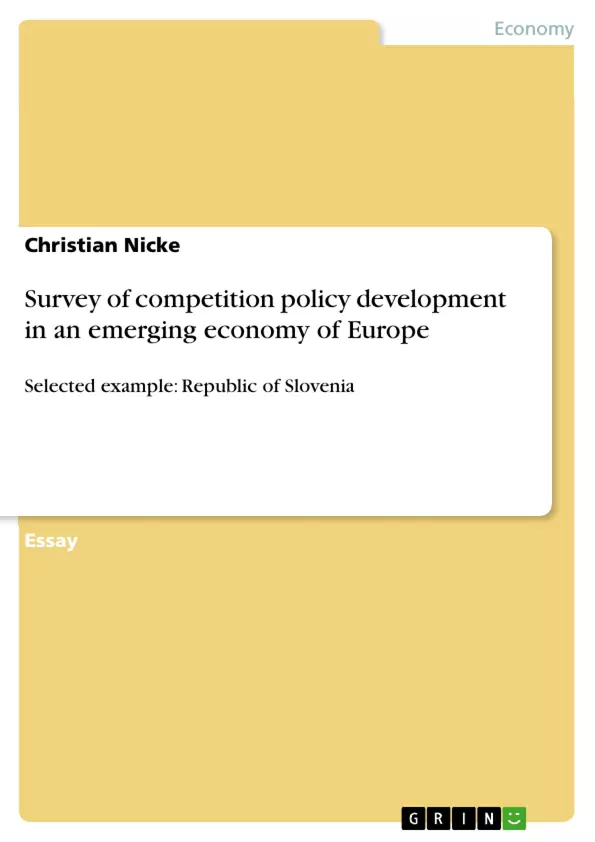This essay includes a general overview of competition policy in the European Union. Special attention is spent on the development of Competition Policy of the Republic of Slovenia.
Inhaltsverzeichnis (Table of Contents)
- I. History of Slovenia
- II. Competition Law in the European Union
- 1. The Founding of the European Economic Community
- 2. Competition Regulatory in the Treaty of Rome
- 3. Today's Competition Policy of the European Union
- III. Competition Policy of the Republic of Slovenia
- 1. Background of Competition Regulatory in Slovenia
- 2. Current Competition Policy
- 3. Responsible Government Institution
- 4. Results of Slovenian's Competition Policy
- IV. Outlook: topics for the future
Zielsetzung und Themenschwerpunkte (Objectives and Key Themes)
This paper examines the development of competition policy in Slovenia, an emerging economy in Europe. It aims to analyze the historical context of competition regulation in Slovenia, the framework of competition law in the European Union, and the current state of competition policy in Slovenia.
- Historical context of competition regulation in Slovenia
- Framework of competition law in the European Union
- Current state of competition policy in Slovenia
- The impact of European Union competition law on Slovenia
- Future challenges and opportunities for competition policy in Slovenia
Zusammenfassung der Kapitel (Chapter Summaries)
- Chapter I provides a historical overview of Slovenia, highlighting its political and economic development from ancient times to its independence in 1991. The chapter examines key historical events that shaped Slovenia's economic landscape, including its inclusion in the Habsburg Empire, its role in Yugoslavia, and its subsequent independence.
- Chapter II delves into the origins and evolution of competition law in the European Union. It discusses the foundation of the European Economic Community (EEC) and the role of the "Treaty of Rome" in establishing the initial framework for competition policy. This chapter also examines the key articles of the Treaty of Rome that pertain to competition regulation and their impact on the Single Market.
- Chapter III focuses on the development of competition policy in Slovenia, providing an analysis of the country's competition regulatory background and the current state of its policy. This chapter explores the responsible government institutions, key legislation, and the results of Slovenian competition policy.
Schlüsselwörter (Keywords)
This paper delves into the key topics of competition policy, economic development, European Union law, Slovenia, historical context, and regulatory frameworks. The analysis focuses on the influence of European Union competition law on the development of Slovenian competition policy and highlights the importance of a strong regulatory environment for fostering a competitive marketplace.
Frequently Asked Questions
What is the focus of Slovenia's competition policy?
Slovenia's competition policy focuses on creating a competitive marketplace by aligning national regulations with European Union standards, especially after its independence in 1991.
How did the Treaty of Rome influence EU competition law?
The Treaty of Rome established the initial framework for competition policy in the European Economic Community (EEC), aiming to prevent monopolies and ensure a fair Single Market.
Which institution is responsible for competition in Slovenia?
The paper discusses the specific government institutions tasked with enforcing competition laws and monitoring market behavior to prevent anti-competitive practices in the Republic of Slovenia.
What are the historical roots of Slovenia's economy?
Slovenia's economic landscape was shaped by its time in the Habsburg Empire, its role within Yugoslavia, and its rapid transition to a market economy post-1991.
What are future challenges for Slovenian competition policy?
Key challenges include adapting to evolving EU regulations, managing digital market dominance, and fostering innovation within its emerging economy framework.
- Citation du texte
- Dipl.-Betriebswirt (FH) Christian Nicke (Auteur), 2006, Survey of competition policy development in an emerging economy of Europe, Munich, GRIN Verlag, https://www.grin.com/document/80394



